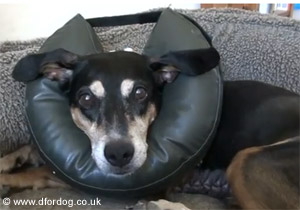Dog Mammary Tumours and Mammary Cancer
With breast cancer awareness at an all time high, it is important to know that breast cancer doesn't just affect humans. Dogs can also get mammary (breast) cancer. In fact it is even more common in dogs than in humans. Female dogs are much more likely to be affected but it can also occur, albeit rarely, in male dogs.

Studies indicate that the incidence rate of mammary tumours in older entire (unspayed) female dogs is about 1 in 4 (25%). But with early detection, treatment can often be successful. Also, mammary tumours in female dogs are almost always preventable. So it is important to know what to do to prevent mammary tumours in dogs, to check your dog regularly for the presence of mammary tumours and to know what to expect if you discover anything different to the norm.
A dog's mammary glands run from chest to groin on the underside of their body either side of the mid line. Each mammary gland has a nipple, each dog typically having 8, although this can vary.
Tumours in the mammary glands can often be discovered by gently feeling the area for any lumps or irregularities. Lumps may be felt anywhere along the mammary chain. Tumours can be slow or fast growing masses under the skin around the nipple area, in single lumps or multiples, showing as solid masses or swellings. Mammary lumps may be fixed or moving. Inflammatory carcinomas can present like mastitis so look for heat or swelling.
Some dogs and even some dog breeds can be predisposed to cancer of the mammary glands. Causes are unknown but hormones are thought to play a part in mammary cancers.
Mammary tumours are more common in older female dogs with the average age of affected dogs being 10 years old. Not all mammary tumours are cancerous. About 50% of dog mammary tumours are benign with the other 50% being malignant. Both benign and malignant tumours grow and can become ulcerated and painful. It is often noted that benign tumours tend to be multiples, smooth and slower growing than the more aggressive irregular single growths often seen in mammary cancers, but this is a guide only and not a diagnostic tool.
The presence of female hormones in the mammary glands seems to contribute to mammary tumours. Studies strongly suggest that unspayed bitches are at an increased risk of developing mammary tumours, and it seems the earlier you spay the better. Many vets recommend a bitch be spayed before her first season, which has been said to reduce the risk of developing mammary tumours to less than 1%. Even if the bitch is spayed before her second season her chances of developing mammary tumours is still greatly reduced (approx 8% risk). However, if the bitch has her second season and is still not spayed, her chances of mammary tumours has now increased to 25% i.e. there is now no reduction in the risk. Whilst the benefit of spaying, in terms of mammary cancer risk, seems to decrease with each oestrous cycle, some benefit has been demonstrated in bitches even up to 9 years of age.
Spaying also has many other advantages. Spaying will of course stop unwanted pregnancies but is also carried out for a number of other reasons such as bothersome phantom pregnancies, life-threatening infections like pyometra and, as we have mentioned, a reduction in the risk of mammary tumours and cancers.
To some extent it is also thought that a dog who is overweight in the first year of life has an increased risk of mammary tumours later in life.
The key to longevity in the case of mammary tumours is early detection. Perform regular monthly checks, especially on middle aged bitches who are unspayed or who were spayed later in life. If you notice anything unusual at all, take your dog to the vet for a thorough check-up immediately. Don't wait a few weeks to see if the lump will go away. Get it seen to straight away.
Your vet will most likely want to know your dog's history, date of spaying if applicable, what symptoms you first noticed and when. They may do a physical exam and general blood work, looking at the dog's general health and also looking for evidence of any spread to lymph nodes and lungs. The vet may or may not perform a biopsy to establish the type and invasiveness of the tumour.

For small tumours up to about 2cm, surgery is often performed to remove the tumour, whether it is benign or malignant. The prognosis in these cases is good. Surgery can even be curative if the tumour has not yet spread. Even for tumours up to 5cm in size, if there has been no spread to the lymph nodes or lungs, surgery can prove very successful.
During surgery for mammary tumours the vet may perform a lumpectomy or may remove the entire mammary gland (mastectomy). Removal of the tumour, mammary gland and surrounding tissue minimises the risk of spread. The entire line of mammary glands may be removed. This is called a mammary strip.
If your bitch is young and not yet spayed the vet will likely suggest she is spayed, to lessen the chance of reoccurrence. After surgery it is important to attend all the follow up checks and to continue to check your dog yourself at home, in case of reoccurrence.
If the tumour is large, cancerous and has already spread then surgery is no longer an option and there is currently no effective treatment for secondary mammary cancer in dogs. Chemotherapy is rarely used or successful. Surgery may be used to improve the quality of life. Unfortunately mammary tumours in male dogs are often aggressive and the prognosis is poor. The prognosis for inflammatory carcinomas is also poor.
Mammary tumours in bitches, especially older unspayed females, is unfortunately quite common but there is so much you can do. Being proactive will certainly increase your dog's chances. Prevent where possible, diagnose early and act swiftly.
Sources:
http://www.caninecancer.com
http://www.petmd.com
http://en.wikipedia.org
http://www.animalcancertrust.co.uk
By Jenny Prevel
© D for Dog www.dfordog.co.uk
This article belongs strictly to D for Dog and we do not authorise the copying of all or any part of it.

My bitch has a mamory tumor.
My female dog had complete mammary strip surgery done today. Results next week will show if the tumour is good or bad. It's going to be a long 10 days 😥
My dog is going for this surgery tomorrow, what was your experience regarding recovery and pain relief .